Consolidation, digitalisation, compliance: The past year was full of changes and challenges – at the same time it was a thoroughly successful year for many promotional products companies. eppi magazine questioned suppliers and distributors all over Europe about their personal résumés for 2017.
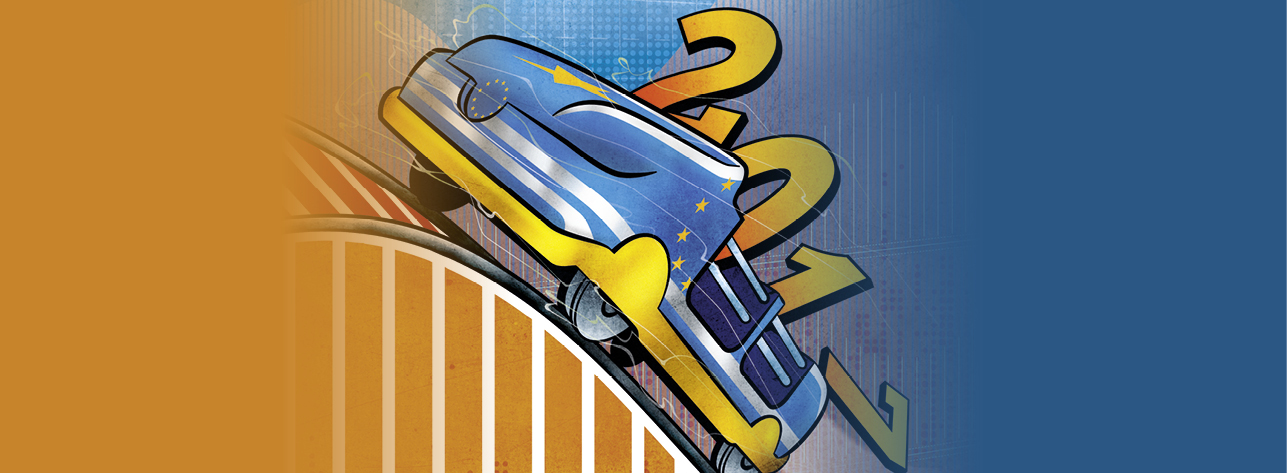
After the in terms of global politics extremely turbulent year in 2016, there were plenty of big question marks at the start of 2017. However, during the first days of January the promotional products industry initially occupied itself with its own questions – for example: Would the first Industry Customer Day, during the course of which users were officially granted access to the PSI Show for the first time, change the face of the show sustainably? Would it be possible to satisfy the different interest groups? Issues that still haven’t been answered or clarified a whole year later. The target group expansion of the show is still a topic of heated discussion. In this way, ten members of the German distributor group, DIE6, jointly quit the PSI and in September the German Promotional Products Association, GWW, declared that they are not supporting the concept for the Industry Customer Day 2018. However, ultimately the premiere of the Industry Customer Day proved to be far less spectacular than expected. The anticipated storm of visitors and immense chaos didn’t happen, so one focused above all on the business instead. At the PSI Show – and the following international industry events in Europe – the industry kicked off the promotional products year optimistically, which many European suppliers and distributors are now, almost twelve months later, largely summing up as being successful commercially speaking (see the interviews on the following pages).
All of this, mind you, in spite of the ongoing tense geo-political situation: Donald Trump hasn’t proven to be an exalted statesman, but indeed partly exceeded the fears surrounding his personality. Europe and the world were furthermore shaken by terror attacks, Governments took a step to the right or were totally absorbed with internal squabbles – i.e. the failure of the Jamaica coalition in Germany in November. The gruelling discussions about Brexit not only caused a slump, but also an ongoing unpredictability of the British economy. “Uncertainty breeds a lack of confidence and the exchange rate obviously impacted pricing“ (Lawrence Angelow, The Advantage Group). The Spanish market was also completely thrown upside down by the Catalonian crisis. Catalonian companies in particular noticed the impact: “It is a very sad situation for us and a boycott is bad for the whole Spanish economy” (Joan Pera, Arpe). However, overall the economic balance within the EU is positive, the European Economic Forecast is predicting a growth rate of 1.8% for the EU gross domestic product. So, one can indeed claim that 2017 was an orderly year economically speaking.
Consolidation carousel
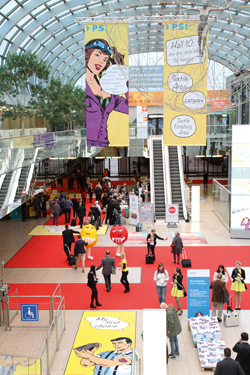
PSI 2017: Positive mood, more exhibitors and a stable premiere of the Industry Customer Day.
Stable and increasing turnovers cannot distract from the fact that the promotional products business is characterised by radical changes, which are continuing and become more intense. 2017 was a year of mergers, take-overs and regroupings: Already at the end of December 2016, the Dutch mass customisation giant, Cimpress, secured itself its own writing instrument production by taking over the American/Irish firm, National Pen. At the start of January 2017, the Dutch promotional products agency, Compacon was integrated into the Plato Group, the parent company of IGO and Clipper. The American agency group, BDA, swallowed the British companies Dukes of London and Sports Merchandise Global in rapid succession. On top of that there were take-overs by investors from outside of the industry: Staples, the parent company of Staples Promotional Products, went to Sycamore Partners, the European-operating agency group, Brand Addition was sold to Elysian Capital. And Perusa Partners expanded its portfolio of promotional products companies – after successfully purchasing Senator in 2016 – by acquiring a further big player from the haptic advertising business: Xindao.
Besides financial assurance and increasing market shares these consolidations are a reaction to the challenges that are carried to the market from the outside. Companies, who want to continue playing in the top league, will have to align themselves accordingly and professionalise their business. “For multinational companies, it is becoming increasingly important to have a global solution that allows them to be present with a dedicated collection in each single national market, while at the same time ensuring brand consistency, quality and product safety” (Fevzi Hasbıyık, Erhas). The Ippag (International Partnership for Premiums and Gifts), which renamed its stock corporation Prominate and expanded it at the beginning of 2017, also does justice to the demands of today’s multinationals for global process solutions.
“We have to become much more digital”
But also for the more locally-operating agencies, as well as for importers and specialists, the maxim is to keep pace. Very small minimum order quantities down to one piece only are in the meantime obligatory in many product areas, in order to be able to satisfy on-demand orders. “The average order volumes continue to decrease” (Bo Willumsen, Poul Willumsen). “We receive plenty of small and middle-sized orders, which involves additional effort regarding the handling, which one has to adapt to“ (Marcin Pawłowski, Badge4u). All of this also has to happen very quickly in many cases. “The pressure regarding delivery times is becoming more intense and higher due to the ‘I want it now’ culture” (Edwin Kats, Pinkcube). These developments are due on the one hand to the fact that decisions about marketing budgets are taken very last-minute. However, a change in mentality as far as the ordering behaviour is concerned, which is becoming increasingly more similar to the common conditions in the B2C sector, is even more far-reaching. Digital natives, who have grown up on the web and for whom smooth online processes are often more important than close relationships, are in the meantime present at many interfaces in the marketing business. “A certain type of customer – aged mostly people between 20 and 30 years – wants to order directly online without our staff’s intervention, because they are used to order processes that are completely digital” (Edwin Kats, Pinkcube), “The younger generation of buyers are not as keen to build a relationship with their suppliers, so the communications are quicker, shorter and only when necessary” (Lawrence Angelow, The Advantage Group). This means for both the suppliers and the distributors: Upgrade to make web shops, but also CRM and ERP systems fit for a digital future – or to be more accurate: the present. “We already generate 70% of our orders online now, but we have to become much more digital” (Kai Gminder, Daiber), “Online trade will play a key role in future, and we will have to fulfil the client’s demands for a nicer online shopping experience” (Geanina Ioan, Chilli Ideas).
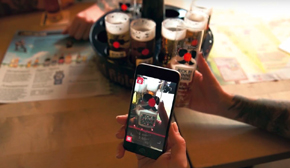
An ongoing trend: Tech gadgets, VR and AR.
And while the promotional products industry is taking on the huge digitalisation project at full speed, at the same time the E-Commerce pioneers from the retail sector are continuing to elbow their way onto the market: In August the US supermarket chain Walmart went online with the platform walmartpromoshop.com, which allows everyone to order individualised products. The Amazon spin-off, Amazon Custom, which has already been active in the USA for some time already, announced this year that a subsidiary is also to be launched in Europe and in July the ECommerce giant declared that its B2B platform, Amazon Business, already has over one million users. There is plenty of speculation about when and how Amazon is going to take the industry by storm big-scale – justifiably too. “Obviously, the likes of Walmart and Amazon must be viewed as real competition, and I think they could test the resilience of the current distributors” (Lawrence Angelow, The Advantage Group). Beyond the fast-paced on-demand business however, the ECommerce giants will soon reach their limits – at least according to the estimations of many industry insiders. In other words: Anyone, who wants more than a product as fast and as cheap as possible, needs specialists, who are familiar with the manifold peculiarities of the promotional products business.
Sword of Damocles compliance
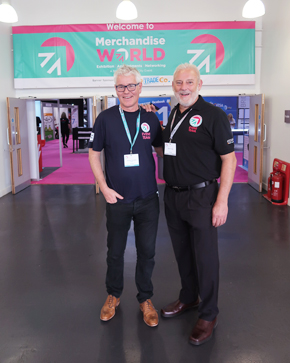
Satisfied: Gordon Glenister, BPMA Director General (l) and David Long, Chairman of Sourcing City, at the premiere of the Merchandise World.
These include product safety and compliance. “As promotional products distributors we have to be able to prove that we know our suppliers and their production processes, and the customer has to be able to rely on this” (Klaus Pohn, Istac), “The demands of the customers and the legislation increase from year to year” (Frédéric Misseri, LAGARDERE). It always was and still is an enormous challenge on the one hand to secure the supply chains and on the other hand comply with the constantly increasing legal requirements – such as the EU guideline on the CSR reporting obligation for instance, which came into force this year. This obliges companies of a certain size to account for their sustainability activities, which in turn means the suppliers are indirectly obliged to make their sustainability strategies public. The bigger a company, the more sensitive it is to risks due to unsafe supply chains. That is why today CSR and product safety strategies have become no less than survival strategies for many promotional products players. “Today, compliance is the biggest threat for our industry. If we neglect it, we run the risk of our customers opting for other media investments” (Thomas Davidsson, Wackes). Because compliance demands are passed on along the supply chain, especially those companies are called upon here that import goods into the EU. Transparency was one of this year’s main issues for many of the big importers. Throughout the course of the year several Dutch full-range stockists launched big PR campaigns and published certificates and CSR reports – with as little gaps as possible, ideally for the entire line-up. On top of that, publications like PF Concept’s brochure Serious about Sustainability, which documented the sustainability strategies in detail, were published.
Product trends
That sustainability has in the meantime become one of the most important themes in the haptic advertising sector, is of course good news. In terms of the products, ecological and fair alternatives to conventional products have become an ongoing trend. “Lately, we’ve seen a real interest in sustainability, before, it was more about ticking a box” (Thomas Davidsson, Wackes). On the topic of trends: A real novelty was launched in 2017 – fidget spinners, which have been flooding the market since the spring – even if the hype ebbed off just as quickly as it emerged. The ongoing popularity of products in the technology segment is much more consistent: Digital gadgets, wearables and increasingly also Smart Home accessories are still at the top of the bestseller lists of haptic advertising media.
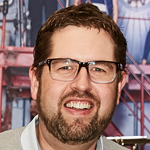 How important is the market of small volume orderers and which role do web-to-print solutions play here?
How important is the market of small volume orderers and which role do web-to-print solutions play here?
Kai Gminder: The business with embroiderers, printers and copy shops has been a constant important market for us for many years. The interesting thing about it is that these companies also order individual sizes in small volumes, so that despite warehouse stocks that no longer suffice in terms of volumes for the promotion market, there are always some items left over. Especially for this clientele there are also suppliers like Flyeralarm or Shirts United, who with their smart online solutions prove to be real rivals and a danger for the classic promotional products market. When one considers that Amazon is meanwhile completely homing in on the B2B market, one certainly starts deliberating about the matter. For us suppliers at the first glance this seems to be a new, renowned customer. But Amazon is of course big enough to have the products from our line-ups that sell well manufactured directly in the Far East themselves.
In the face of such competition the theme E-Commerce is becoming increasingly more important for the industry…
Kai Gminder: Here, everyone has to get involved, otherwise one will have missed the boat. We have been occupying ourselves with creating our own James & Nicholson world online for several years and we invest a lot of time and money in data maintenance. It is my aim to digitalise the entire process from the order generation through to the picking process in the warehouse in order to minimise the effort, but also the sources of error. We already generate 70% of our orders online now, but we have to become much more digital. Of course, new orders with customisations are too consulting-intensive to be able to wind these up exclusively via the website, but noncustomised orders or follow-up orders can be processed completely digitally.
Is there going to be an industry standard for data collection and processing at any point in time?
Kai Gminder: That is wishful thinking, but it will probably never happen, because the systems can’t communicate with each other. This already begins with the fact that the textile companies have to subsume different sizes under one article number, which is not the case for the writing instrument suppliers for instance.
Daiber has brought an organic cotton collection out onto the market for the first time. How did it go down with the distributors and users?
Kai Gminder: We are noticing that we introduced this offer at exactly the right time. A few years ago price was still very decisive, today I think particularly the young people think totally differently and are prepared to spend more if the environment feels the benefit. However, our organic collection is not much more expensive than comparable products made of conventional cotton. It does cost more, but not double the amount. Sweatshirts and hoodies will follow. It is conceivable that we will convert the entire collection over to organic cotton at some stage.
What is your opinion about the discussion involving the PSI Industry Customer Day 2017/2018?
Kai Gminder: For us, the whole project was never about the individual industry customers. The distributor was and always will be our field sales force and those, who want to do direct business, don’t need the PSI platform for the purpose. I see it much more as an opportunity for our industry to demonstrate to the users at the PSI Show that the promotional products market is a significant and professionally-operating branch of industry and that we don’t do any dubious business. Hence, I find it a shame that so many distributors are against the Industry Customer Day. For instance at shows like the A+A, having industry customers and distributors alongside each other presents no problem at all.
 How did the year 2017 go for you?
How did the year 2017 go for you?
Julian Thormählen: So much has happened it feels like it has been three years. We started the year off as newcomers, got to know lots of resellers at the PSI Show, then travelled around Europe exhibiting at dozens of trade fairs and now we feel that we have actually arrived in the promotional products industry – also on an international basis. The company experienced strong growth this year: In the meantime we have 30 employees in Germany, our team in China has grown at the same level and the turnovers are very stable. We have also felt the benefits of the good economic situation in Germany and were able to realise many great projects. However high-volume orders tend to be the exception – the daily business is characterised more by high numbers of smaller orders with volumes in the three-digit region.
Which role will the online sector assume as a sales channel over the next few years?
Julian Thormählen: E-Commerce will play a leading role. The promotional products industry hasn’t arrived in the digital era large-scale yet, many companies still have more of a traditional alignment. Several industry-internal software solutions are outdated and don’t offer a front-end that is compatible with the modern standards. The conventional promotional products search engines will die out long-term – here Google, Alibaba and co. will gain the upper hand. The significance of the social media will also increase – for us it is already essential today and the most important marketing and sales channel, followed by the large industry shows and media. In the past, sales representatives were decisive for the industry, today digital tools and networks are replacing the classic field work in many cases, since they offer clear advantages such as an increased reach, tracking and measurability. However, all of this doesn’t mean that personal contact has become obsolete, on the contrary: The creation of a trusting relationship via face-toface communication is irreplaceable, especially when it comes down to projects that require intense consulting and where high sums of money are involved.
Which challenges do you anticipate regarding the cooperation with the promotional products trade?
Julian Thormählen: Many promotional product distributors demand absolute loyalty from us the suppliers in terms of exclusively doing business with the trade, ideally they would like to forbid us from setting up our sales channels as we see fit. They don’t however stick to the rules which they have set themselves. It has already happened that I have talked a project through together with a distributor and his customer and the distributor went off afterwards and ordered a copy from an importer in order to improve his margin. That is downright impertinent – especially against the background that we support the trade with extensive, free marketing materials. A supplier/distributor relationship has to be respected on both sides. Hence, we concentrate primarily on our premium partners and reserve ourselves the right to terminate cooperations if they don’t work. For us the most efficient trade fairs are those which enable us to explain our products to the industry customers directly, such as the HAPTICA ® live for example.
What about the other side of the value chain – are the classic structures in the import markets also breaking down?
Julian Thormählen: China will continue to hold a leading position in the promotional products sector in the future. However, the industry should prepare itself for the fact that mid-term many Chinese companies will try to tread the direct path to Europe. China has built up a very strong position, in the meantime Chinese designers and engineers develop products on a par with the European level. Furthermore, it becomes increasingly easier to have project-related special designs produced under one’s own direction. This is why more and more users will order directly from China in future. If Alibaba continues to further improve its user-friendliness – i.e. via product configurators – the situation will become really exciting. Furthermore, Chinese producers will seek to establish cooperations with European E-Commerce suppliers.
 How do you assess the year? Have there been any special challenges?
How do you assess the year? Have there been any special challenges?
Lawrence Angelow: The competition in the market appears to be fiercer with profit margins being put under pressure. The timescale from quote to order is increasingly shorter, with very many requests for express service orders. This, of course, tests both the distributor and the supplier and so the need for good communications and accurate detail is greater to ensure orders are satisfactorily delivered, on time and meeting the expected quality demands.
Has the Brexit debate had an effect on your business and how do you think Brexit will affect the industry in the future?
Lawrence Angelow: The initial impact was twofold: The decision to leave caused great uncertainty and affected the exchange rate. Uncertainty breeds a lack of confidence and the exchange rate obviously impacted pricing. I believe these two factors will continue. Every day the UK media has a new Brexit story or perspective, so it is firmly anchored in the minds of the people. For the future, no one truly knows the real impact, so it is immense speculation right now.
2017 saw several high-profile mergers and acquisitions within the industry, some big promotional products companies changed ownership. Is this consolidation an ongoing trend, and if so, what does this mean for the industry?
Lawrence Angelow: In a market like ours it is difficult to achieve organic growth, so the way forward for the ambitious mid-range and larger companies to grow is either through acquisition or through operating satellite offices in key locations. The opportunities for smaller companies will continue to exist because their offering is different: The small specialists are often very personal and extremely focussed and they provide a “boutique”-like service.
Players from outside the industry are increasingly pushing their way onto the promotional products business. To what extent do you consider this a threat?
Lawrence Angelow: Particularly in the UK, we have seen before that bigger is not always better. Obviously, the likes of Walmart and Amazon must be viewed as real competition, and I think they could test the resilience of the current distributors. However, it may be that existing companies, in time, can learn from their presence and adapt their models accordingly where necessary. Whether these new players can offer the flexibility and creativity required in today’s market remains to be seen.
The Generation Y is starting to take on executive positions. Is this leading to a mentality change among the buyers?
Lawrence Angelow: I hear many stories that the younger generation of buyers have no real loyalty and are not as keen to build a relationship with their suppliers, so the communications are quicker, shorter and only when necessary. It can be no real surprise in a generation where social media, soundbites and mobile devices dominate daily lives. The whole process of personal interaction is, therefore, far removed from the previous generation. However, perhaps the good news for distributors is the experience that they can offer the new breed of buyers coming through, which can assist them in excelling in their role. In essence, I feel the distributors just have to tailor their relationships to suit how the buyer wants to work.
 How did the turnover develop in 2017? Were there any fluctuations within the year?
How did the turnover develop in 2017? Were there any fluctuations within the year?
Kaspar Benz: We were slightly able to increase our high-level turnover compared to last year. The Christmas business continues to lose significance so that our monthly turnovers have proved to be very equally balanced.
What types of promotional products agencies have chances of surviving – is there a future for the “medium-sized” distributor?
Kaspar Benz: In my opinion, the size of a distributor doesn’t play a role in his chances of survival. Innovative power, creativity and ability to learn from experiences are far more important factors.
Do you offer services beyond the promotional products business, if so, why?
Kaspar Benz: We are always open to new approaches, however in business fields which nevertheless are related to merchandising or promotional products. One example of a service that goes beyond the pure promotional products business was: Last year we developed a nationwide prize-draw for a customer, which we completely carried out ourselves from A to Z – from the concept, to the web design, to the procurement and the design of the raffle tickets, purchase and design of the immediate prizes, through to the procurement of the main prizes and the winner management process. It was a large-scale and exciting experience that we learnt a lot from.
Is there increased demand for sustainable products and does the market offer the corresponding alternatives?
Kaspar Benz: The theme is booming again. But the basic problem remains to be the fact that there is a lack of convincing products that can be recommended as being sustainable with a good conscious. On closer examination, a lot of things that are offered on the market have precious little to do with sustainability.
Compliance regulations have been a big challenge for some time already. How did the theme develop in 2017? Are there any noticeable restrictions for example such as fewer orders or even the loss of customers?
Kaspar Benz: As mentioned, the Christmas business has become less significant, which is most certainly attributable to the stricter compliance regulations. Because they are frightened of impeaching the guidelines, many customers, especially the big companies, no longer dare to implement customer gifts. Also in the case of the gifts we distribute ourselves to our customers, situations arise repeatedly where the customer first of all asks what the value of the gift is. A grotesque development, which will however be more or less impossible to curb.
 As in the previous years, there were several fusions and take-overs in the promotional products industry again in 2017. What effect does this increasing consolidation have on the market?
As in the previous years, there were several fusions and take-overs in the promotional products industry again in 2017. What effect does this increasing consolidation have on the market?
Frédéric Misseri :The promotional products sector is one of the last industries that hasn’t been subject to extensive consolidation processes yet. The market is still strongly fragmented. I estimate that there are around 1,500 companies in France that sell promotional products and that under 500 of them represent 70% to 80% of the market. Because the entry threshold on the market is very low and no high qualifications are required, there are a lot of unprofessional players. On the other hand, a professionalization process is taking place that is increasingly picking up speed. The more serious companies have long since recognised that there is far much more to sell than merely products and some of them will grow fast, take over large market shares and sustainably alter the industry environment. This is precisely the reason why we founded the international company Prominate within Ippag (International Partnership for Premiums and Gifts). When we present our service portfolio to our target group – large multinationals – they are frequently surprised. However, the more frequently services are offered that go beyond the pure distribution of products, the more popular they become. This development results in a regrouping of the market. This is good for the entire industry because it will increase the share of haptic advertising in the marketing mix and thus lead to higher turnovers.
Is it a threat that big players from the online and retail trade will elbow their way onto the haptic advertising market?
Frédéric Misseri :Yes, the risk does exist, but it is difficult to assess how big it is. Companies like Vistaprint, which deliver ready imprinted products in small volumes in a fast and simple process, will no doubt win over a certain share of the market. The IT solution Amazon Business addresses promotional products buyers with could also enjoy a certain degree of success, but one doesn’t know how the market will react. There are reservations against Amazon, which I myself also notice among my customers. Furthermore, industry-internal IT and logistics solutions are often not only cheaper but also much more flexible and customizable. Today, it is no longer about just ordering things as fast and inexpensively as possible. More and more customers are aware that many products on the market are completely useless and a waste of money. One of the most important questions we ask the customers is thus: What return on investment are you expecting and what should the products achieve? In order to illustrate this, we compare for instance a “Twister” USB stick – one of the worst products ever – with a tailor-made model that we developed in our internal Design and Creation Studio which shows a retention rate far higher than the Twister model. The more sensitive the users become towards such themes the more unlikely it is that they will simply order basic products online. Products that are customised to suit marketing objectives, campaigns or companies, require a competence in consulting and production that Vistaprint, Amazon & co. can’t offer.
A challenge also lies in observing and documenting the increasingly stricter compliance guidelines. What is your current status report regarding CSR and product safety?
Frédéric Misseri :The demands of the customers and the legislation increase from year to year. Unfortunately, not all of the players in the supply chain are playing along – starting with the producers in China: There are a small number of factories, which have raised the level, but there is no universal improvement. That is partly due to the fact that most of the producers in the Far East not only manufacture for the demanding European and US American markets, but also for markets where CSR and product safety are often totally irrelevant. Corruption is also widespread – I have personally witnessed how a factory manager bribed two auditors in the Far East. So, importing remains to be a major challenge and the importers who can guarantee 100% compliance for his line-up are rare.
Will the CSR debate lead to the prices being reassessed?
Frédéric Misseri :The question should rather be: Will the European promotional products trade raise the bar or will it continue to sell products that are not conform? As long as there are competitors, who underbid the price level that is normal for safe products, the users won’t accept higher prices. When large volumes are involved, the theme CSR suddenly becomes uninteresting. One shouldn’t wait for this to change, but indeed actively change the situation oneself. We do this by explicitly and in detail outlining the additional costs that are incurred as a result of the CSR aspects in our quotes. One has to educate one’s customers – this is down to each and every distributor.
Beyond this are there any ways to take action against unsafe products?
Frédéric Misseri :There are two ways – the one is via a laboratory, the other is via a lawyer. Both are difficult. I have more than once been tempted to have products of rivals, who underbid me, tested when I came across them, but it’s not my role. However, I would immediately agree to invest in an independent initiative that anonymously tests and evaluates products put on the market by our industry.
 Since mid-2017 you have been the President of the Austrian Association of Promotional Distributors (VÖW). To what extent does the VÖW occupy itself with the omnipresent theme compliance?
Since mid-2017 you have been the President of the Austrian Association of Promotional Distributors (VÖW). To what extent does the VÖW occupy itself with the omnipresent theme compliance?
Klaus Pohn: The legal provisions are absolutely reasonable, however they are over-fulfilled by some companies. There are fewer invitations to major events with the corresponding framework programmes due to the compliance regulations. At the same time, this means that the order volumes for the promotional products planned in the scope of such events are also declining. Generally speaking, though as an association there is no indication that a noteworthy number of customers has disappeared or that orders have been cancelled. The VÖW relies on the growing understanding that promotional products are not conceived to be a personal gift. Promotional products represent the value of a company vis-à-vis the respective target group – and this still has the greatest marketing relevance. As the VÖW we are called upon to support our members as a competent contact partner and advise them as efficiently as possible on the relevant compliance aspects.
Walmart, Amazon, Flyeralarm and co. are winning market shares with their growing ranges of promotional products. Should the industry fear the new suppliers?
Klaus Pohn: Of course, the price of a promotional product is relevant for the customer, but expert consulting and product quality also play a significant role and companies can definitely use these points to distinguish themselves from their rivals. How high will the customer satisfaction be if a ballpoint pen stops writing after two pages or the promotional logo starts to fade after the T-shirt has only been washed three times? Who guarantees that goods ordered from China or India via the Internet were not produced by children? Who assures that no palm oil was used for the production, for which huge forest areas were cleared? This brings us to an essential point: Sustainability. An aspect, which has also become more a more a theme within the European economy and which is reflected in the CSR agendas of the companies. This is why as promotional products dealers we have to be able to prove that we know our suppliers and their production processes. And the customer has to be able to rely on this.
The digital natives are starting to take over executive positions. What influence is this having on the customer mentality?
Klaus Pohn: The Internet and the digital world have in the meantime become part of everyday life and online advertising is profiting from increasing marketing budgets. We are thus strongly focusing on haptic elements of daily life, such as textiles for instance, because feeling and touching are increasingly becoming an experience. In future we have to consider this experience character more closely for promotional products too. That is why we are currently planning an expert congress that is dedicated to this theme.
Take a look ahead at the future: What does the promotional products agency of the future look like?
Klaus Pohn: Nobody can say exactly what the promotional products agency of the future will look like. However, one thing is certain it will be specialised and qualified and will have to be competent in all areas of marketing. The customer will thus receive a professional and individual consultation and the result will be a tailor-made promotional product, which is best suited to his requirements. A further scenario is the “promotional products industry as a service“, which takes current technologies such as augmented reality into account or implements 3D printers for the production process. I think the increased production of small batches, which can be adapted to suit the respective target groups, is also realistic. In short, this means that consulting, graphics and design as well as new technologies are those factors that will shape the industry in the future.
 What is your résumé for 2017?
What is your résumé for 2017?
Edwin Kats: It was a good year for us, we are really noticing that the economy is picking up. The first few months were a little difficult, many of our colleagues within the industry came to a similar conclusion. However, things started gathering speed again from April onwards and overall we received 30% more orders over the course of the year compared to 2016. One thing we noticed this year: a certain type of customer – aged mostly people between 20 and 30 years – wants to order directly online without our staff’s intervention, because they are used to order processes that are completely digital. Our customer journey was not ready for that yet, many steps in the process were not clear or were not yet geared up for self-service. We identified the pain points, made improvements in many areas and the number of direct website orders has more than doubled. The formula is simple: if your website works, you get the order.
Does that mean you see a mentality change among the buyers?
Edwin Kats: Yes, not in absolute terms, but there is definitely a trend towards a new buyer behaviour. The young generation of customers is much more internet savvy. They work on various devices and are good at multitasking. They don’t have a 9-to-5 mentality, they expect a quick response time. They are demanding and far less loyal, which means they do not value “regular suppliers” to the same extent the previous generations did. With our brand promise “Effortlessly the most beautiful result” we explicitly address this generation. Ease of ordering, flexibility, quality and speed are our key values.
How important is it for you to keep pace with the trend towards print on demand solutions?
Edwin Kats: Quite important. The pressure regarding delivery times is becoming more intense and higher due to the “I want it now” culture. More and more often clients decide to initiate orders at the very last moment. They expect a great deal of flexibility and because we respond well to this, we distinguish ourselves from the traditional players.
Has the trend towards many small orders instead of fewer large volume orders been ongoing?
Edwin Kats: Yes, the average order value decreases every year. Of course, customers want to stock less and the MOQs are decreasing thanks to printing methods such as digital print. But we also see it as a compliment that ordering is apparently so easy that a customer can just as simply order small quantities several times rather than just placing one big order. The ease of ordering ensures that customers return and frequently re-order, thus, our retention increases.
How do you assess the fact that the ecommerce giants from the retail trade are also increasingly pushing their way onto the promotional market?
Edwin Kats: The price pressure will in any case increase because new entrants want to gain market share. A certain type of customer will be very interested in what Amazon & co. have to offer. Many distributors may look at this development with concern, but we have confidence in our own approach. I see the entry of such players as an interesting development, it will improve the level of our industry as a whole.
So what does the promotional products agency of the future look like?
Edwin Kats: It will be 100% e-commerce, on a much higher level than the stage we are at today. Standard products will be available online without human intervention. Customers will be able to see immediately what their product will look like in a very detailed way. In addition, even faster delivery times will become the norm, as well as 24/7 contact options via all devices and communication options in real-time.
 How was 2017?
How was 2017?
Geanina Ioan: Now in its tenth year, the company has maintained a steady growth rate, but more importantly, we have developed a series of new business projects and we have started making our activities more visible. In May, we became the new Romanian member of Ippag (International Partnership for Premiums and Gifts). Last, but not least, we celebrated our company anniversary with a big party in Bucharest in September.
Do you offer any services beyond the promotional products business?
Geanina Ioan: Yes, we do offer additional services in close connection to the core business because there is a need for this demanded by our clients. The market is growing intensively, and we need to keep up with the requests for services like IT, warehousing or supply chain management. Expanding services represents a new and exciting area of business for us that we intend to develop more and more.
Which role will e-commerce assume in the coming years?
Geanina Ioan: In Romania, e-commerce is still blooming. The progress in technology is enabling the ecommerce sector to be more reachable and efficient. It has experienced unprecedented growth, especially over the last two years: The Romanian B2C e-commerce sales totalled 1.8 bil. Euros last year. In 2017, the turnover grew by 22% up to 2.5 bil. Euros. While the smartphone penetration rate in Romania was 50% in 2015, this figure increased up to 70% last year. The top Romanian online shops saw a significant increase in mobile device traffic reaching their websites, as over 50% of the online shop visits were activated from a smartphone or tablet last year. In the B2B area, it is a very similar situation, the online trade will play a key role here too in future. We will have to fulfil the client’s demands for a nicer online shopping experience. In 2018, we are planning to upgrade to a new online & e-commerce platform which claims to describe and offer all necessary info for any type of customer.
Is the end user looking for standard or custom-made products?
Geanina Ioan: Usually, all clients want custom-made products, but unfortunately, not all of them have the time or capacity to have them produced. This is why we mostly tend to realise true custom- made products only for well-established brands and long-term campaigns. We offer in-house design and we can provide 100% custom-made products, but most of the time we focus more on selecting standard products – of course in line with the respective brand value, client’s brief and guidelines.
Is there an increased demand for sustainable products and does the market offer such alternatives?
Geanina Ioan: In our increasingly connected world, consumers are becoming more educated about the environmental impact of a growing population competing for finite natural resources. To put it simply: Most people are more open to less harmful products, especially if they are as easy to find and use as other products. For millennials sustainability is a shopping priority. And it seems that they continue to be most willing to pay extra for sustainable offerings. For us, it is essential to provide international certifications, to prove the fact that we are not only performing and are up-to-date with new systems and technologies, but also with regulations regarding sustainability. We are ISO 9001, ISO 14001, ISO 27001, OHSAS 18001 and SRM 8000 certified and have been evaluated by the independent international CSR platform Ecovadis. As an Ippag member, we have access to the know-how of all of our external partners and we benefit from the cooperative’s audited and certified supplier network. We encourage our customers to opt for eco-friendly products and they are beginning to understand that it’s cool to promote their business in a sustainable way.
 How was 2017 for your company?
How was 2017 for your company?
Joan Pera: Altogether, the year has been going well albeit slightly under our forecast. We had expected to achieve a 7% sales increase, but we will probably finish the year on around 5% growth. So it’s below last year’s average growth, but it is still quite good and considering the political situation in Spain in terms of the Catalan conflict we must conclude that this development in turnover is positive.
Which effect did the controversy around the Catalonian independence have on your business?
Joan Pera: This question is difficult to answer because normally we don’t know why a customer stops buying from us. However, we think it is very likely that the political situation has affected us in some way. If we compare the development of our sales in Spain excluding the Catalonian market with the development in the rest of the EU, one observes that in Europe we have attained a 17% growth, whereas in Spain the figures are falling. It is a very sad situation for us and a boycott is also bad for the whole Spanish economy, but luckily it is not affecting us in Europe. We want politicians to start negotiations to resolve the conflict as soon as possible.
Has the trend towards many small orders instead of fewer big ones been ongoing?
Joan Pera: Yes, the trend has been continuing this year. We keep on receiving more and more small orders, and they are important for us. At the same time, many small orders involve more administrative work to ultimately reach the same turnover.
Is “Made in Europe” a sales argument?
Joan Pera: Yes, for sure. We produce everything on-site in Barcelona and our European production is a very important advantage and argument for us. But the fact that our brand stands for Barcelona- style design is maybe even more important. We also think that the concept of an ecological and sustainable product will become increasingly more important on the market.
Which challenges do you see when dealing with the promotional products trade?
Joan Pera: Of course, price is always a big challenge, but smaller order quantities and shorter delivery times are also in high demand among our customers, along with quality, certified safety and environmental aspects.
 You have been the CEO of Senator since last summer and have introduced several restructuration measures: How successful were they?
You have been the CEO of Senator since last summer and have introduced several restructuration measures: How successful were they?
Daniel Jeschonowski: Senator has found its way back to old strengths. We are relying on our core competence: Writing instruments as well as cups and mugs. We have oriented ourselves on our customers here, by committing ourselves to a comprehensible portfolio and fixed contact persons in the back-office and in the field. We have been growing much faster than the market since last year. Our margins can in the meantime be described as being “healthy”. We are satisfied with our development in the export sector, especially in Europe, even if this only corresponds to the market average.
Did the German elections have an impact on your business directly or indirectly?
Daniel Jeschonowski: All of Senator’s plastic writing instruments are “made in Germany”. This includes the entire value chain. Together with balloons, ballpoint pens are the number one advertising medium implemented during elections. This combination contributed to a very successful year for us. Each party that is committed to democratic principles is in good hands with us.
Which new developments are there in the customising technology sector?
Daniel Jeschonowski: Are certain techniques going to become extinct soon? There is no one technology that will replace everything else. It is small steps and diverse innovations that assert themselves. The digitalisation is having the strongest effect here. It already replaces many of the classic tasks of film generation, exposure and the production of sieves in the pre-press phase as well as in the screen and pad printing processes. At Senator we additionally rely strongly on the theme digital printing for the improvement of these background processes. We use this method in the meantime for almost all of our writing instruments in line with the customers’ requirements and can reproduce graphics now that were impossible using the raster technology ten years ago. On the other hand, there is not going to be a comparable alternative for high-quality full-colour motifs to the screen printing technique for a long time to come yet. Incidentally, for cups and mugs the same applies for sublimation and direct printing.
Senator’s owner Perusa recently also purchased the Dutch importer Xindao: Is this effecting your business?
Daniel Jeschonowski: The two product portfolios and the value chains don’t overlap. Xindao is traditionally strong in procurement and trade, Senator is an industry company. So we are talking about two very different companies here. Perusa has no plans to change this.
How has the market for writing instruments developed?
Daniel Jeschonowski: We have a good insight into the official figures thanks to the industry association ISZ. However, it is more important for us to maintain a close exchange with the other central European manufacturers. In the course of which one thing becomes clear: The pressure through cheap suppliers has not increased further over the past years. Customers are increasingly appreciating the quality that a German or Swiss product offers – and still prefer to fall back on ballpoints or cups and mugs especially for repeat orders. The promotional product is representative for the promoted brand and it should thus display the same high-quality as the brand itself
 Have there been any special challenges in 2017?
Have there been any special challenges in 2017?
Marcin Pawłowski: Yes, we had some projects that kept us busy: We have started building a new, 1,000 m² warehouse, which we are planning to finish in May 2018. Further challenges included purchasing a rotary heat press from Transmatic, a Mimaki printer and two flatbed plotters from Zund. This not only involves a large investment, but also a huge logistical challenge, after all these high-performance machines have to be seamlessly integrated into our workflows as efficiently as possible.
Which product trends are prevalent? Have there been any new trends in 2017?
Marcin Pawłowski: Thanks to the omnipresent distribution of digital end devices and the increasing sensitivity for data abuse and cyber criminality, gadgets that ensure more security are high in trend. Our Cardguards – protective cases for RFID cards – or our new item, the Camera Blocker – an adhesive sticker that covers over the camera of your smartphone or laptop – are proving extremely popular. We are currently also in the process of launching a camera cover for laptops and computers. However, among our range of products – cheap give-away gadgets – button badges are still the most prevalent best-sellers.
This means you are active in a product area where high volumes tend to prevail. Are you in spite of this observing that the average order volumes are declining, as is the case in many places on the market?
Marcin Pawłowski: Yes, we can confirm this too. We receive plenty of small and middle-sized orders, albeit on a very frequent basis. This involves additional effort regarding the handling, which one has to adapt to. Luckily, however, we still do receive some very large orders now and again.
How are the import markets developing and which role does China play in this respect?
Marcin Pawłowski: We import some raw materials from China and we are observing the fact that the prices are rising higher and higher. Of course, this ultimately has an impact on the import markets: I believe in the near future some products will be manufactured to 100% in the EU.
Which novelties do you think will emerge in print and decoration?
Marcin Pawłowski: Are there any techniques that are about to become “extinct”? In addition to the meanwhile ubiquitous digital print, there are some upcoming solutions in the give-away area that enable one to imprint and emboss items at the same time. Imprints on metallic material are also more and more popular. I don’t think any of the printing techniques will become obsolete, even in times where digital techniques dominate
 How was 2017 for your company?
How was 2017 for your company?
Fevzi Hasbıyık: It was a good year. Over the past five to six years we have achieved on average 45% growth each year. In 2017, we are expecting to achieve a growth rate of 30%. We have signed new distributorship agreements and lots of new customer joined our portfolio.
Has the political situation in Turkey had an effect on your business?
Fevzi Hasbıyık: No. The Turkish economy is powerful and usually grows each year, unaffected by political events. 2016 was a hard year for the Turkish economy, especially the second half of the year. We were nevertheless able to increase our financial turnover by around 40%. For 2017, a growth rate of between 5% and 7% is expected for the Turkish economy. The biggest challenges for us are the new tax regulations in import and the depreciation of the currency. These challenges have taught us to take fast decisions and to optimise our crisis management. Every crisis also brings with it opportunities, and so far, after each crisis we came out even stronger.
How are the import markets developing and which role does China play in this respect?
Fevzi Hasbıyık: No one can dispute China’s importance for our industry. But the imports from China have been very highly taxed by the Turkish government over the last two years to support the local producers. In the meantime, Turkey has assumed an important role as a production location for a variety of products, with short delivery times due to its geographic location and considerable tax advantages. We aim to take on a stronger position on the international markets through Turkish production, but at the same time we are still sourcing a lot from China.
What does the promotional products agency of the future look like?
Fevzi Hasbıyık: Nowadays, customers are looking for an agency that can supply all inquiries from one source and which offers professional purchasing and a creative team for product design and development. Customers also require reliable and strong partners to outsource procurement and logistics processes. For multinational companies, it is becoming increasingly important to have a global solution that allows them to be present with a dedicated collection in each single national market, while at the same time ensuring brand consistency, quality and product safety.
Is there a trend towards products that are custom-made to suit a specific target?
Fevzi Hasbıyık: The customers are always searching for products that are trendy, unique and which help them stand out from the crowd. In the case of most of our customers we set up an annual purchasing plan and prepare yearly collections. In the process of doing this, we always aim to think outside of the box.
 How did your turnover develop in the fiscal year 2017?
How did your turnover develop in the fiscal year 2017?
Berdine Heilig-de Boer: We were able to record a 10- 15% growth rate again this year – Germany, Scandinavia and France hold enormous potential for us. One fact that definitely pays off, is our frequent participation at trade fairs. Every year new shows are added to the list, in-house shows can also be worthwhile.
What about the legal situation – are new guidelines soon going to be influencing the industry?
Berdine Heilig-de Boer: We make drinking bottles out of plastic and make sure of course that all of the components are foodsafe and high-quality. Nevertheless, plastic is still a difficult field – it is very probable that the legislation regarding its implementation and processing will be further tightened up soon. When one considers the global pollution caused by plastic waste and the tonnes of useless packaging in the retail trade alone, such measures are of course necessary.
An increasing number of suppliers make their certifications accessible, also online. Which role does transparency play within the industry?
Berdine Heilig-de Boer: Our certificates are actually not listed online, but we do mention on our website that we have successfully passed the Smeta 4-pillar audit. In this strictest stage of Smeta (Sedex Members Ethical Trade Audit), which is part of the Sedex (Suppliers Ethical Data Exchange) initiative, in addition to the working conditions and safety standards, the ecological balance and the business ethics of a company are tested. If customers require further information on our certificates, we are pleased to provide detailed information per e-mail. Transparency is a decisive factor in separating the wheat from the chaff. One can’t be careful enough, particularly in the case of products that come into contact with foodstuffs and for many companies in the industry it is standard procedure to allow customers to take a close look at the work processes.
Which challenges do you see regarding cooperating with the promotional products trade?
Berdine Heilig-de Boer: The quality of the distributors often varies greatly especially at international level. Some of them are very forward-looking and rely on the latest technology, others are still very traditional, almost old-fashioned in their communications. We even still receive orders per post. This is why we have to work out individual strategies for each region and the respective customers – which is a difficult, but also exciting process.
What is the situation with the price margins for customisations – are the printing costs still being accepted?
Berdine Heilig-de Boer: I think so. We dispose of our own machinery, which definitely pays off since we work with very big volumes and produce millions of sports bottles every year. The dispatch costs actually cause more of a problem and lead to complaints. International sales are continually on the increase and the dispatch companies are overtaxed. This keeps pushing the dispatch costs up higher and higher.
 How did the fiscal year 2017 go for you?
How did the fiscal year 2017 go for you?
Maciej Mackowiak: PromoNotes has been recording double-digit growth rates for over ten years. Of course, it has been the peak season since September, which usually carries on until the end of the year, but we haven’t experienced any big fluctuations.
Big non-industry players are increasingly elbowing their way onto the promotional products market. Do you consider this to be a risk?
Maciej Mackowiak: It is no longer a surprise that the online sales are rising – of course this development encourages the surge of smaller and larger internet platforms, which are in turn becoming a threat for the industry. However, normally these shop operators don’t produce goods themselves so they have to purchase the products they sell – manufacturers like ourselves are among the sources.
The legal guidelines are becoming stricter and the obligations more comprehensive. What are your experiences here?
Maciej Mackowiak: Most of our products are located in the lower price segment, so among others compliance guidelines mostly don’t affect us. Furthermore, we mainly use raw materials from Europe for the production, which already possess all of the important certificates and we produce exclusively in Poland, so that many of the legal requirements don’t apply for us like they do for importers. The biggest challenge that we are faced with in this connection is the diverse certification processes, which we have to carefully prepare internally. For example, last year we spent a lot of time preparing and carrying out the FSC audit and we are already thinking about obtaining a further certificate. The entire process through to the observance of the guidelines for the corresponding certificate is very time and money-consuming.
Which role does transparency play within the industry?
Maciej Mackowiak: If the customers enquire about such issues, we put together the information and provide them with it, i.e. on the FSC certificate or other raw material certificates and CSR documents. For certain information on the other hand we have to ask our suppliers about the latest status – this allows our customers to understand and track our processes and the raw materials used. However, since we don’t work together with industry customers, I can’t say how important transparency is here.
How did the first Industry Customer Day go at this year’s PSI Show? What are you expecting in 2018?
Maciej Mackowiak: Only very few industry customers visited our stand, so I can’t really comment on the matter. We are indeed eager to see how industry customers are received at the coming PSI show, but we won’t be making any special preparations in this respect and we won’t be specifically taking this into account when drawing up our stand concept
 What is your résumé of the year?
What is your résumé of the year?
Bo Willumsen: Overall, it was a good year, the turnovers remained stable and their development was satisfactory. As a company that exports 95% of its goods, the EU market is decisive for us and overall the situation is positive, even if the individual markets do vary strongly in some cases as far as the mentality, decision-making times and payment goals are concerned. As a European manufacturer, we have to accept the fact that the average order volumes continue to decrease – because the higher the order volumes, the greater the probability that an order is processed in the Far East. However, a pleasant development is the fact that we are increasingly registering follow-up orders and that once we have won over customers, they stay with us.
Is “Made in Europe” a sales argument?
Bo Willumsen: The label has a certain prestige value, but it is not a decisive argument, because at the end of the day the cost issue always plays a major role. So, companies that want products that are as cheap as possible, buy in the Far East and we can’t compete with their prices. However, the prices are also rising in the Far East, thank goodness, so that the arguments that we can offer have more weighting today than ten years ago: We offer uncompromising quality, the majority of our designs are exclusive and patented and we are fast and reliable. These tangible factors count for much more than the “made in Europe” label. Often the good experiences the customer have made with our company lead to them returning to us after making a fleeting outing to the Far East.
Which other challenges do you come across in dealing with your partners in the promotional products trade?
Bo Willumsen: The market is becoming more and more open and the distribution channels are merging. If the traditional structures are to carry on working, we have to be more open in our dealings with each other and cooperate together more efficiently. We know who is loyal to us and we establish partnerships with these companies. We pass on enquiries that we receive from users – for example at trade fairs – to good, selected trading partners. Vice versa the trade has no need to be nervous that we seek to establish the contact with users: Direct selling is not an option for us – we would only damage ourselves in doing so.
Against this background what do you think about the Industry Customer Day at the PSI?
Bo Willumsen: The premiere went well for us, we were able to present our products to interested users. Overall the Industry Customer Day offers both exhibitors and distributors opportunities. Probably more industry customers will attend in 2018, but they won’t come in masses and certainly not from international companies. As a result, above all the German market benefits from the Industry Customer Day. Whereby the PSI should urgently occupy itself with increasing the international appeal of the trade show again. Since we have to take part in national shows all over Europe, our costs for exhibitions have rocketed. I have always been a friend of the PSI Show, but the PSI doesn’t always know what the market wants and in some cases it fights against itself. The fact that the opening hours were extended until 6 p.m. on the third day, although there are hardly any visitors left on Thursday afternoon, is totally incomprehensible to me and very annoying for the exhibitors who have a long journey home
 How was your year and what kept you busy?
How was your year and what kept you busy?
Thomas Davidsson: The second part of 2017 has been better than the first part, mainly because we won over some new clients just after the summer break. To properly comply with all the compliance guidelines and stay up-to-date with all of the laws and regulations remains a real challenge – in an industry as diverse as ours there simply are so many pitfalls to avoid. Today, compliance is the biggest threat for our industry. If we neglect it, we run the risk of our customers opting for other media investments instead because of the risk that lies in promotional products. So, we have to do everything we can to ensure this risk is eliminated. Another ongoing trend is the pace of the market. It’s all about quick decisions and shorter and shorter lead times, which we have to be able to keep up with.
Talking about speed: To what extent do you consider Amazon, Vistaprint, Walmart & co. a threat?
Thomas Davidsson: Of course it’s a threat when companies with that kind of muscle power enter our business. But there is also another side to the coin. These companies are all transactional driven, but we have the knowledge about how to use our media to get the most out of the clients’ investment. Since we maintain close relationships and often develop and maintain web shops jointly with our clients, we also have the possibility to extend our offer using printed material, etc. So, we are quite wellaligned to face the competition of the big retail e-commerce players.
How are the import markets developing and which role does China play in this respect?
Thomas Davidsson: China still is the production country number 1 for our industry. With regards to the environmental problems occurring in China, in the meantime I see a determination on the Chinese government side to address these issues. Let’s hope this will result in a more sustainable world, rather than our industry moving its production to other countries with fewer regulations.
Is the demand for sustainable products and solutions increasing further?
Thomas Davidsson: Lately, we’ve seen a real interest in sustainability among our clients. Before, it was more about ticking a box. So yes, the demand is increasing rapidly, but unfortunately at the end of the day it all comes down to money. While the company leaders are talking about sustainability, further down in the organisations savings and low prices remain the decisive factors.
So what does the promotional products agency of the future look like?
Thomas Davidsson: I do hope one day we will be seen as the media that brings the highest ROI because of our creativity, efficiency and the low cost of the investments made. However, realistically speaking I think our future lies in developing primarily platforms for process management and logistics solutions, because this is what the market is increasingly and urgently demanding of us. And in such a scenario haptic advertising is not really perceived as being a medium, but instead as a mere commodity
Global power China
Many of these trend products are not only produced in China today, but also developed there too. It has long since not only been the buyers, who bring the ideas to China in order to have them realised there as cheaply as possible, but to an increasing extent Chinese designers and product developers, who are setting the benchmarks for the global market. “China has built up a very strong position and Chinese designers and engineers develop products on a par with the European level” (Julian Thormählen, Tradeconthor). Away from cheap production, towards high-tech and design – that also means: A cleaner industry. Indeed, the Chinese Government is in the meantime finally tackling the problem of environmental pollution big-scale and is asserting its power to implement environmental laws. As a result, according to media reports, tens of thousands of factories and coal-fired power stations all over China have had to at least temporarily shut down, because they didn’t achieve the prescribed emission targets. More than 7,000 inspectors are currently checking, who had breached the new regulations. While China has developed from being an emerging country with low wages into a global economic power the Chinese manufacturers are pushing their way onto the European market, supported by the respective exhibition organisations – i.e. the Mega Show Paris that was staged for the first time in November 2017 or the Asia Premium Fair that is scheduled to take place in London in 2018. At the same time it is merely a question of time before the direct route to China also becomes accessible for end users – because it will have become uncomplicated enough.
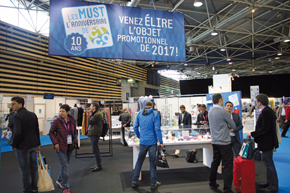
The CTCO in Lyon turned 10.
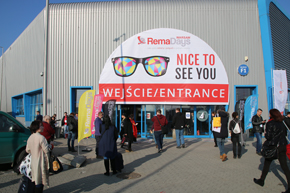
Strong growth again at the RemaDays in Warsaw.
Flexibility counts
Irregardless of which point of the value chain one starts at: The fact that the traditional distribution channels are merging is a process that is no longer irreversible. “The decision-makers are ultimately not bothered, who they order their products from – the main thing is that the offer is right” (Julian Thormählen, Tradeconthor). This doesn’t mean that professions within the industry are at risk of becoming extinct. It means far more that the distributors and suppliers have to rethink their position and adapt in line with the new developments. “The size of a distributor doesn’t play a role in his chances of survival. Innovative power, creativity and ability to learn from experiences are far more important factors” (Kaspar Benz, Pandinavia), “If the traditional structures are to carry on working, we have to be more open in our dealings with each other and cooperate together more efficiently” (Bo Willumsen, Poul Willumsen).
Companies that want to continue to be successful on the haptic advertising market, primarily have to display one asset: Flexibility. A lot of things that still worked in 2017, may be totally different in 2018, the full effect of many things that happened last year won’t be recognisable until the next few months. Hence, the year 2017, will end just like it began: With questions. The following pages also contain many questions – however, these will be answered, as far as possible.
// Till Barth








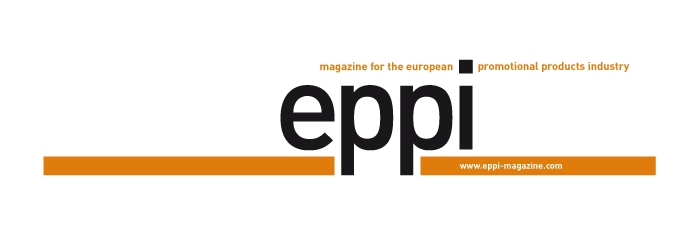
 How important is the market of small volume orderers and which role do web-to-print solutions play here?
How important is the market of small volume orderers and which role do web-to-print solutions play here?
 How did the year 2017 go for you?
How did the year 2017 go for you?
 How do you assess the year? Have there been any special challenges?
How do you assess the year? Have there been any special challenges?
 How did the turnover develop in 2017? Were there any fluctuations within the year?
How did the turnover develop in 2017? Were there any fluctuations within the year?
 As in the previous years, there were several fusions and take-overs in the promotional products industry again in 2017. What effect does this increasing consolidation have on the market?
As in the previous years, there were several fusions and take-overs in the promotional products industry again in 2017. What effect does this increasing consolidation have on the market?
 Since mid-2017 you have been the President of the Austrian Association of Promotional Distributors (VÖW). To what extent does the VÖW occupy itself with the omnipresent theme compliance?
Since mid-2017 you have been the President of the Austrian Association of Promotional Distributors (VÖW). To what extent does the VÖW occupy itself with the omnipresent theme compliance?
 What is your résumé for 2017?
What is your résumé for 2017?
 How was 2017?
How was 2017?
 How was 2017 for your company?
How was 2017 for your company?
 You have been the CEO of Senator since last summer and have introduced several restructuration measures: How successful were they?
You have been the CEO of Senator since last summer and have introduced several restructuration measures: How successful were they?
 Have there been any special challenges in 2017?
Have there been any special challenges in 2017?
 How was 2017 for your company?
How was 2017 for your company?
 How did your turnover develop in the fiscal year 2017?
How did your turnover develop in the fiscal year 2017?
 How did the fiscal year 2017 go for you?
How did the fiscal year 2017 go for you?
 What is your résumé of the year?
What is your résumé of the year?
 How was your year and what kept you busy?
How was your year and what kept you busy?
